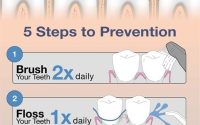The Dangers of Tooth Decay and How to Prevent It
Introduction
Tooth decay is a common dental problem that affects people of all ages. It occurs when the bacteria in your mouth produce acids that erode the enamel, leading to cavities. If left untreated, tooth decay can cause various complications and negatively impact your oral health. However, with proper preventive measures, you can significantly reduce the risk of tooth decay and maintain a healthy smile.
The Dangers of Tooth Decay
1. Cavities
The primary danger of tooth decay is the formation of cavities. Cavities are small holes that develop on the surface of your teeth due to the erosion of enamel. They can cause pain, sensitivity, and discomfort while eating or drinking. If left untreated, cavities can grow larger and affect the deeper layers of your teeth, leading to more severe dental problems.
2. Tooth Sensitivity
As tooth decay progresses, it can cause increased sensitivity to hot, cold, or sweet foods and beverages. The erosion of enamel exposes the underlying dentin, which contains tiny tubules that connect to the nerves of your teeth. When these tubules are exposed, you may experience sharp, shooting pain or discomfort when consuming certain foods or drinks.
3. Toothache

Untreated tooth decay can eventually lead to a toothache. The decay reaches the inner layers of your tooth, including the pulp, which contains nerves and blood vessels. When the pulp becomes infected or inflamed, it can cause severe pain and discomfort. A toothache can significantly impact your daily life, making it difficult to eat, speak, or concentrate.
4. Abscess
In some cases, tooth decay can progress to the point where it causes an abscess. An abscess is a pocket of pus that forms at the root of the tooth. It is a serious condition that can lead to severe pain, swelling, and even facial cellulitis. If left untreated, an abscess can spread to other parts of the body and cause systemic infections.
How to Prevent Tooth Decay
1. Maintain Proper Oral Hygiene
Brush your teeth at least twice a day using fluoride toothpaste.
Summary
In this blog post, we will explore the dangers of tooth decay and discuss effective ways to prevent it. We will delve into the causes of tooth decay, its potential consequences, and the importance of early detection and treatment. Additionally, we will provide practical tips and strategies for maintaining good oral hygiene, including proper brushing and flossing techniques, the use of fluoride, and the significance see page of a balanced diet. By following these preventive measures, you can significantly reduce the risk of tooth decay and enjoy optimal dental health.
- Q: What is tooth decay?
- A: Tooth decay, also known as dental caries or cavities, is the destruction of the tooth structure caused by acids produced by bacteria in the mouth.
- Q: What are the dangers of tooth decay?
- A: Tooth decay can lead to pain, infection, and tooth loss. It can also affect overall health, as bacteria from the mouth can enter the bloodstream and contribute to various systemic diseases.
- Q: How can I prevent tooth decay?
- A: To prevent tooth decay, it is important to practice good oral hygiene, including brushing your teeth at least twice a day, flossing daily, and visiting your dentist regularly for check-ups and cleanings. Additionally, limiting sugary and acidic foods and drinks, and using fluoride toothpaste and mouthwash can help prevent tooth decay.
- Q: Are there any risk factors for tooth decay?
- A: Yes, several factors can increase the risk of tooth decay, including poor oral hygiene, frequent snacking, sugary and acidic food and drinks, dry mouth, certain medications, and genetic predisposition.
- Q: Can tooth decay be reversed?
- A: In the early stages, tooth decay can be reversed through remineralization, which is the process of restoring minerals to the tooth enamel. However, once a cavity forms, it cannot be reversed and requires dental treatment.

Welcome to my website! My name is Spencer Rossi, and I am a dedicated and passionate dental assistant with extensive experience in general dentistry, braces, aligners, cosmetic dentistry, and pediatric dentistry. I am thrilled to have the opportunity to share my knowledge and expertise with you through this platform.



